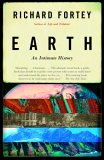Summary | Excerpt | Reviews | Beyond the Book | Readalikes | Genres & Themes | Author Bio

An Intimate History
by Richard ForteyChapter 1
Up and Down
It should be difficult to lose a mountain, but it happens all the time
around the Bay of Naples. Mount Vesuvius slips in and out of view,
sometimes looming, at other times barely visible above the lemon groves.
In parts of Naples, all you see are lines of washing draped from the
balconies of peeling tenements or hastily constructed apartment blocks:
the mountain has apparently vanished. You can understand how it might be
possible to live life in that city only half aware of the volcano on
whose slopes your home is constructed, and whose whim might control your
continued existence.
As you drive eastwards from the centre of the city, the packed streets
give way to a chaotic patchwork of anonymous buildings, small factories,
and ugly housing on three or four floors. The road traffic is
relentless. Yet between the buildings there are tended fields and shaded
greenhouses. In early March the almonds are in flower, delicately pink,
and there are washes of bright daffodils beneath the orchard trees; you
can see women gathering them for market. In the greenhouses exotic
flowers such as canna lilies can be glimpsed, or ranks of potted plants
destined for the supermarket trade. Oranges and lemons are everywhere.
Even the meanest corner will have one or two citrus trees, fenced in and
padlocked against thieves. The lemons hang down heavily, as if they were
too great a burden for the thin twigs that carry them. The soil is
marvellously rich: with enough water, crops would grow and grow.
This was an abundant garden in Roman times, and it still is, even if
crammed between scruffy apartments and scrap-metal yards. Volcanic soil
is rich in minerals; it is correspondingly generous to crops. Outside
the city, Vesuvius is more of a continuous presence; the ground rises
gently towards its brown summit. New buildings cling on to the side of
the mountain, even high up among the low trees and broom bushes that
clothe its flanks. The buildings are indistinct, however, hidden by a
creamy-yellow haze of petrochemical smog spreading outwards from the
frantic centre of Naples towards the mountainside. You pass a road sign
to Pompeii, but from the road there is little to distinguish this suburb
from any other, for all its fame.
When the road rises into the hills that abut the southern margin of the
Bay of Naples, the urban sprawl begins to thin out. The orange groves
are more orderly, with the trees neatly planted in rows inside cages
made of makeshift wooden struts, draped over the top with nets. The
slopes become much steeper than on the volcanic flanks—close terraces
piled one upon the other, each banked up with a wall of pale limestone
blocks. Medium-sized trees with small grey-green leaves—which appear
almost silvery in the afternoon light—cling to the most precipitous
terraces. These are olive trees, the definitive Mediterranean survivors,
oil producers and suppliers of piquant fruit. Their deep roots can seek
out the narrowest cracks. They relish limestone soils, however poor they
are in comparison with volcanic loam. The villages in this part of the
bay are as you would expect of regular, tourist Italy, with piazzas and
ristorante-pizzerias and youths with slick hairstyles on the lookout for
a fast buck. Even this long before the summer season there is
opportunity for a smooth operator. You find yourself agreeing to hire a
cab for a day for ¬200 to hug the congested roads, when you could
travel faster on the excellent Circumvesuviana railway for a tiny
fraction of the price. Somehow, you, the visitor, have become the rich
volcanic soil primed to yield a good harvest.
Excerpted from Earth by Richard Fortey Copyright © 2005 by Richard Fortey. Excerpted by permission of Knopf, a division of Random House, Inc. All rights reserved. No part of this excerpt may be reproduced or reprinted without permission in writing from the publisher.






Your guide toexceptional books
BookBrowse seeks out and recommends the best in contemporary fiction and nonfiction—books that not only engage and entertain but also deepen our understanding of ourselves and the world around us.